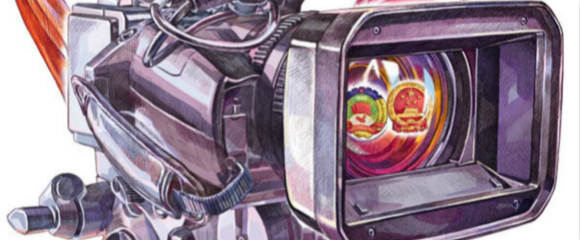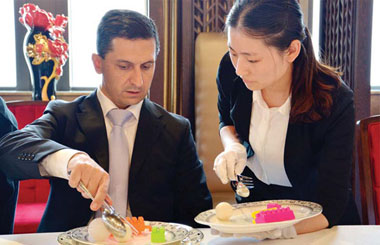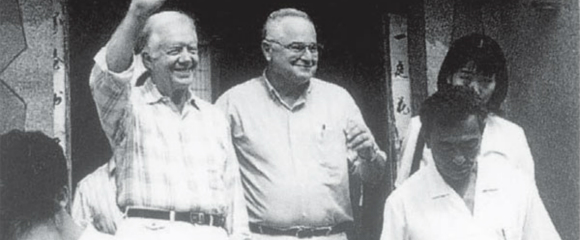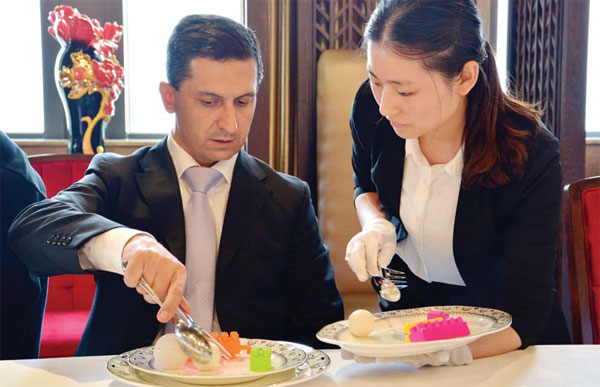School that serves up butlers
Updated: 2016-03-11 08:11
By Li Yang(China Daily Europe)
|
|||||||||
|
|
The number of wealthy Chinese keeps rising, prompting greater demand for highly trained domestic staff
"Can a newspaper really be ironed, and what for?" asks Pei Yuchen, an office clerk at a state-owned enterprise, after reading about a school for butlers in Chengdu in the southwestern province of Sichuan.
The 30-something's second question was: "Can a butler really make 1 million yuan ($152,000; 138,500 euros) a year?"
Pei is considering quitting her job, which she describes as "boring and predictable", because she believes working as a butler for a wealthy family will not only fatten her purse, but also be an eye-opening experience.
Tang Yang, public relations manager of the International Butler Academy in Chengdu, says she often received phone calls from people such as Pei after the media reported the opening of the school, the first of its kind on the Chinese mainland, in July 2014.
The academy is affiliated with an academy based in the Netherlands run by a veteran butler, Robert Wennekes, who was born into a butlering family. Wennekes established the academy in 1999 in a 14th-century castle, after recognizing the great difficulty of finding high-quality, professional butlers for his clients.
As more billionaires appeared in China, Wennekes opened the Chengdu school in 2014, in cooperation with a local businesswoman in the real estate industry. "After mansions, cars, yachts, jets and bodyguards, wealthy Chinese families need butlers. Higher-end property projects are also in dire need of senior butlers to improve the quality of their services," says Pu Yan, the school's marketing director.
"The level of butler service directly indicates the taste of the masters. And China's new rich will pursue higher tastes of etiquette and higher-quality family life, which entails quality butler services."
The Chengdu school has two teaching sites - one in a luxury villa in Chengdu's suburbs, the other in a private club in a high-rise in an up-market residential community, with a grand view of the Jinjiang River.
Owned by Wennekes' Chinese business partner, the two sites provide a real-life household environment in which to instruct students.
After paying 40,000 yuan in tuition - enough to pay for eight years of college tuition in Sichuan - the trainee butlers receive six weeks' "intensive and professional" training from instructors from the United States, Italy, Switzerland, Canada, Germany and the Netherlands, in addition to three meals a day and a butler's suit.
The first few days of training are the most interesting, according to Vincenzo Matarrese, an Italian instructor and former bartender at a five-star hotel in Europe.
He says that in the first few days the Chinese students learn to become familiar with a whole range of Western etiquette and protocols, from personal grooming to setting tables and pouring wine. He displays different kinds of grapes on the table and explains the differences between various types of wines.
Liu Kecheng, former manager of a five-star hotel and now a travel consultant for wealthy Chengdu residents, attended the training sessions through his company's cooperation with the school.
"It was the first time I learned that it takes about two hours to clean a pair of shoes through 12 procedures. I realized how considerate, meticulous and good at handling multiple tasks a successful butler should be," Liu says.
Christopher Noble, an Ohioan who is director of training at the Chengdu school, graduated from the academy in the Netherlands in 2012. He says China is one of the first civilizations in history to have butlers, called guanjia, or "housekeeper".
"What we are reintroducing here already existed for hundreds of years," he says.
But the cultural differences between the West and China constitute a major obstacle for the instructors.
Noble has noticed that there are many differences between serving a Western employer and a Chinese one.
"Chinese businessmen and businesswomen tend to hold their household staff at arm's length. In the West, they give the butlers trust and the butlers are in the inner circle. Butlers sometimes even know more about their masters than the other family members do," he says. "I should know everything about you, and your personal life, not because I am nosy, but because the knowledge can help me better serve you."
Although the Chengdu academy instructs trainees in Western standards, most of the students have to adapt to the practical circumstances in their future Chinese principals' homes.
liyang@chinadaily.com.cn 
Today's Top News
German voters batter Merkel over migrant policy
Car bomb kills 34 in Turkish capital
Growth focus
Opening a window on rural China
Experts confident in growth objective
Clinton, Sanders spar over immigration
Scholar praises pragmatic government work report
China hits back at US over ZTE restrictions
Hot Topics
Lunar probe , China growth forecasts, Emission rules get tougher, China seen through 'colored lens', International board,
Editor's Picks

|

|

|

|

|

|







